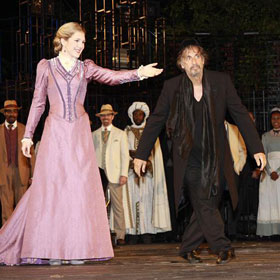Shakespeare in the Park: A Merchant of Venice

3.5/5
Continuing their fine tradition of non-profit arts initiatives, The Public Theater once more returns to The Delacorte in New York's Central Park for the summer season, this year presenting – free to the public – productions of Shakespeare's comedies: A Winter's Tale, and a Merchant of Venice, headlined this year by the venerable Al Pacino. An 1800 seat open air arena The Delacorte is a unique experience, with (weather permitting) performances preceding through Twilight and into the warm summer nighttime. The sadly all-too-frequent police helicopters are a bit of a bugger, but really a minor blemish on what is otherwise a terrific night out.
The bards many tales, fine and enduring as they are, are nothing if not anachronistic, and A Merchant of Venice is no exception. An interesting choice of production given it's many charges of anti-Semitism, but, lest we forget 16th Century Elizabethan England was not exactly a climate well recognized for ethnic and religious tolerance. Indeed, often times a despicable, flame haired, hunched over Jew would many times fill the role of what would now be considered the pantomime villain.
Here the role falls to the great Al Pacino, in the role of Shylock, a scheming lender who goads his bitter rival, Antonio, into guaranteeing his friend's loan to the bond of a pound of flesh, fully intent of making sure these monies can never be repaid. The motives for Shylock's deep-seated dislike for Antonio are pure caricature (he lends money gratis!) and Pacino is clearly enjoying himself, his fidgety body language and twitchy demeanor far better suited to the stage these days than the screen.
As with most of Shakespeare's comedies, it's not really all that funny, and much of the humor comes in the form of misinterpretation, dramatic irony, or the notion that all one needs to become instantly unrecognizable to their beloved is to don a wig and clothes of the opposite sex. Strangely, it's also a play packed to the rafters with one unlikable character after another. It is, after all, Antonio's obstinate pride that makes him obliged to Shylock to begin with. And in getting him out of it, Portia, betrothed to the man whose loan this was (now crippled by guilt) resorts to common trickery, setting aside the law simply so that the Jew, as he comes to be known, cannot be seen to triumph.
While the cast is uniformly fine, special mention must go to Lily Rabe for the role of Portia, who has the presence and the gusto of a young Cate Blanchett about her. Praise is also due Pacino for being brave enough to play Shylock as was intended, and not as overly sympathetic, as has become the fashion. Though the leanings are certainly there; the Jew trapped in a device of his own making, stripped of lands, assets, and ultimately his identity through a forced conversion to Christianity. Were the perspectives reversed it could almost be a tragedy.
RELATED ARTICLES
Get the most-revealing celebrity conversations with the uInterview podcast!







Leave a comment